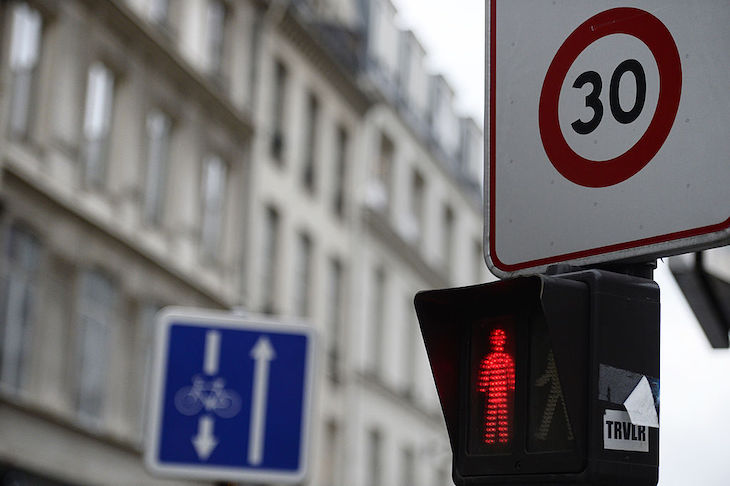Drivers could soon be prosecuted for travelling 1 mph over the speed limit, at least if some MPs get their way. The all-party parliamentary group on walking and cycling (APPGWC) also proposes stiffer penalties for drivers of heavy cars like SUVs involved in accidents, and an invariable requirement for a fresh driving test for anyone disqualified. However well they may go down among a certain class of activist, it’s not difficult to see that these are all fairly terrible ideas.
First, speed limits. Current informal guidance from police chiefs, pretty widely observed in England (though not in Scotland) is ’10 per cent plus 2′: in other words, ignore speeds up to 35 mph in a 30 mph zone, 57 in a 50 mph zone, and so on. This must go, the APPGWC say. Why? Half of motorists sometimes speed; prosecuting them represents nothing more than the ‘foundation of road justice’; and any leniency ‘fosters a belief that traffic law does not need to be taken seriously’. Besides, because technology now makes it easier to catch miscreants we should embrace it.
Someone off the road for driving home after one too many at a wedding doesn’t have a driving skill problem
Quite apart from the sheer bossiness involved in treating British people going about their ordinary business like wayward schoolboys who must be made to do exactly as they are told and stop slacking, this is distinctly problematic. Take a technical excess of 1 or 2 mph on a fast and fairly empty road – a place where, incidentally, cyclists and pedestrians are likely to be pretty few and far between, and indeed in some cases are prohibited. This is normally harmless and often difficult to avoid: indeed, encouraging drivers to be constantly checking the clock rather than the road may well create more peril than it averts. And that is before we even start on the effect on the police. Telling them in the name of ‘road justice’, whatever that means, to book people regularly for technical but harmless speeding will waste their time, prevent them investigating more crimes that do matter, and further sour relations between them and the public whose help they need.
The idea that SUV drivers causing accidents might be treated more harshly by criminal courts than others (as lorry drivers already are) is equally preposterous. The reason given is that SUVs are heavier ordinary cars: but whatever some MPs may think, there is an obvious difference in kind between a large van or truck and a Range Rover. There is also the point that if weight is involved, electric and hybrid cars are sometimes a good deal heavier than ordinary ones, as also are loaded vans. Unless drivers of the latter are also to be penalised, this begins to look less like a technical application of the principles of kinetic energy and more like a condescending sideswipe at people who drive SUVs.
Demanding that disqualified drivers retake a test (something, incidentally, that in some cases courts can already order) might sound sensible, but not for long. True, some drivers may need it – for example, those disqualified through showing repeated inability to react to hazards. But they are a minority. Someone off the road for driving home after one too many at a wedding, or following multiple instances of speeding, doesn’t have a driving skill problem. The driving test no doubt examines many things, but these do not as far as we know include the ability to refuse a glass of prosecco, or the knowledge that one shouldn’t behave like Peter Simple’s J. Bonington Jagworth on one’s way to the golf club.
And there is a practical point. Test appointments are difficult enough to come by already. To clog the system up still further by mandating extra unnecessary ones is frankly bonkers, even if it might increase job opportunities for test administrators.
Did the members of the group not see these points? Possibly. But there is almost certainly more to it than that. Whisper it quietly, but the members of the APPGWC (many of whom are anti-Tory), while no doubt interested generally in the rights of walkers and cyclists, are one suspects also keen on the opportunity to virtue-signal by establishing their bien-pensant and environmentally correct credentials. Apart from what seems like a thinly-veiled attack on the SUV-driving classes, the proposals on speed limits and driving tests for the disqualified have many of the hallmarks of an agenda of making it more difficult to drive generally, and a patrician contempt for ordinary people who prefer the convenience of their cars to the vagaries of public transport.
That we often get foolish and partisan proposals like this from all-party parliamentary groups, and for that matter select committees, should not surprise us. APPGs, being open to all parliamentarians, are a natural home for earnest lawmakers with bees in their bonnet. Much the same goes for the supposedly more staid and formal select committees: when it comes to picking their members, those with known strong views are more likely to be chosen to serve, if only at times to keep them occupied and out of the way.
Meanwhile, we must always remember that, however seriously some papers take them, reports from such bodies are frequently little more than the dressed-up musings of mild but self-important eccentrics with an agenda. As voters we must also insist that, when push comes to shove, what matters is the view of our representatives in parliament as a whole, and not those of the well-meaning pressure-groups that attach themselves to it. Let’s hope these proposals don’t see the light of day.






Comments